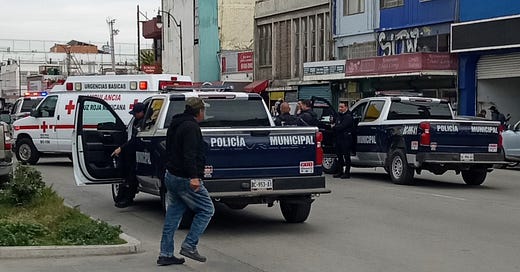Zeta magazine: 50 Tijuana municipal police officers removed per year for corruption
The Border Center for Journalists and Bloggers (BCJB) shares a summary and analysis of the leading news on the border on January 8, 2024.
Zeta weekly magazine.- The Tijuana Public Security Department removes an annual average of 50 municipal police officers for corruption, abuse of authority, bribery, and non-compliance with protocols, José Fernando Sánchez González, Municipal Public Security Secretary, informed the weekly newspaper Zeta. Replacing these elements is difficult, says Sánchez González, since the municipality faces budget difficulties. Tijuana currently has 2,258 municipal officials but faces challenges such as imminent retirements and officials with disabilities, in addition to the problem of corruption. The CENFOCAP police training academy can only offer 500 cadets a year due to budget constraints, making it challenging to replace corrupt officers and meet the city's policing needs. Despite this, he said, Tijuana police achieved a 9.5% reduction in homicides in 2023 and confiscated more than 1,000 weapons.
However, Jesús Alejandro Ruiz Uribe, state delegate of Development Programs in the Baja California federal government, described the situation as "very serious" and stated that the police are "infested" with corrupt elements linked to drug trafficking, which contributes to the high crime rates in Baja California. He proposed a military intervention to reorganize the police, suggesting temporarily eliminating the current commandos.
Border
50 Tijuana municipal police officers are removed every year for acts of corruption
Tijuana Police “is infested”; military authorities must “intervene”: delegate Ruiz Uribe
Ciudad Juárez, epicenter of violence against women in Mexico
The border Ciudad Juárez closes 2023 with 25 femicides
Gas monitor data shows unhealthy air quality near Tijuana River watershed
San Diego Union-Tribune.- Since September, six air-quality monitors installed by the San Diego County Air Pollution Control District in San Ysidro have measured gases like hydrogen sulfide near the Tijuana River watershed. The data confirms the community's long-standing concerns about unhealthy air quality, with hydrogen sulfide levels sometimes exceeding state and federal standards. This gas, linked to the millions of gallons of sewage-tainted water flowing over the border, causes irritating odors and health issues for Imperial Beach, San Ysidro, and surrounding areas.
The monitors also track other harmful gases contributing to poor air quality. This first-of-its-kind, around-the-clock data collection in the area will help understand the severity of long-term exposure to these gases. The district plans to comprehensively relocate five monitors across South County to understand the air quality. This initiative, supported by a $100,000 federal grant, aims to provide evidence for decision-makers to effectively address sewage pollution and its impact on public health.





